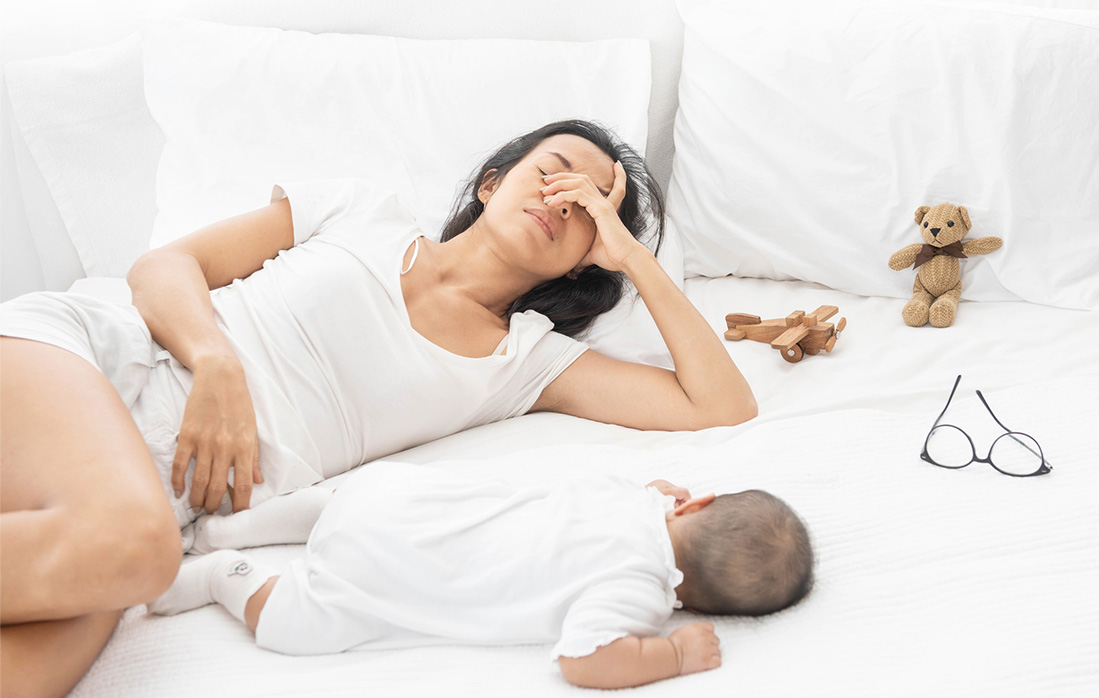
According to a recent survey, 45 percent of the responding adults who feel resentful about their partner’s sleep say they get less than the minimum seven hours per night recommended by experts (1). To make matters worse, their partners reportedly have no problem getting at least seven hours or more, creating a divide between couples that can take a toll on their relationship.
Recent research shows that when sleep is lacking, coupled people tend to feel less grateful, more angry, and less happy with their relationship (see Sleepopolis’s picks for Best Mattresses for Couples, for a brighter perspective!). But while being chronically tired makes positivity a challenge, it’s also a struggle to sleep well when experiencing negative emotions — creating a negative feedback loop.
“Sleep is highly influenced by overall well-being, including mental and physical well-being,” says Matthew Schubert, a Licensed Professional Counselor (LPC) practicing in Boise, Idaho. Mental health is also fragile when sleep is hard to come by, with research linking it to higher anxiety, depression, and lack of self-control. It’s easy to forget that romantic relationships are also crucial to many people’s mental well-being. When they aren’t going well, happiness and life satisfaction can be hard to come by (2).
Lack of Sleep Leads to Division Between Couples
More than half of the surveyed couples who experience jealousy in their relationships have different sleep schedules, which can cause tension and division between them. In fact, a third of these relationships experience feelings of frustration, irritation, and a lack of intimacy due to their differing sleep schedules.
Most telling, over a third of these couples say they experience a lack of emotional connection and may even resort to sleeping separately, a habit Schubert says comes with consequences. “If we do not share a bed with our partner, then the relationship will lack both physical and emotional intimacy,” he warns.
Relationships are notoriously tricky to manage, and it takes a lot of intentional behavior from both partners to experience a fulfilling relationship, Shubert points out. “One behavior that should always remain intentional is to share a bed and a sleep schedule when life allows you to,” he says.
Shubert explains that feelings of jealousy targeted at a partner’s sleep habits can permeate into other areas of the relationship, such as jealousy of mental or physical wellness. In fact, it might be a partner’s better health that creates sleep jealousy in the first place.
“Inadequate sleep usually reflects underlying mental health issues rather than existing as an isolated problem,” says Schubert. “However, a vicious cycle can form where both sleep and mental health rapidly decline due to the impact each has on the other.”
Focus on Your Own Sleep Habits
According to Schubert, experiencing negative feelings towards your partner for their healthier sleep habits is a form of projection. Couples can likely improve their relationships and quell resentment by focusing on their own habits instead of their partner’s. “It falls into the category of poor mental health and lack of self-awareness — instead of dealing with your negative feelings, they are believed to have originated from someone else,” he says.
Only 43 percent of the surveyed adults said they were satisfied with their current sleeping situation, and a whopping 89 percent expressed a desire to improve their sleep quality. Moreover, around two-thirds of such adults seek new remedies to help them fall and stay asleep.
Communicate for Better Sleep
The best fix, according to Schubert, is for each partner to be self-aware of their thoughts, feelings, and desires so they can communicate properly and not project on to their partner. Then, couples need to speak openly about their needs and desires to help tame their resentful feeling that these needs aren’t being met.
And while the popular “sleep divorce” remains an option, especially if one partner is disrupting another’s ability to sleep, Schubert warns that intimacy can and will be lost and needs to be discussed and addressed with intentional behavior from both partners. “Couples can go to bed together to get that intimacy and then separate beds or rooms before it’s time to sleep,” he says.
Ultimately, couples should work together to find solutions such as adjusting their sleep schedules, seeking professional counseling, or simply having an open and honest conversation about their needs. If you find yourself feeling envious of your partner’s sleep, taking steps to improve your own can improve your overall well-being, relationship dynamics, and, ultimately, life satisfaction.

The Best Mattress for Couples: Expert Tested to Help You Reach Couples Goals

Is There a Link Between Insomnia and Sexual Dysfunction? A New Study Has Surprising Answers

How a Better Night’s Sleep Can Improve Your Sex Life

Fighting Sleep Deprivation as New Parents
Sources
1. Levy, Sandra; “Unisom study: There’s a ‘Great Sleep Divide’ between couples,” Drugstore News; https://drugstorenews.com/unisom-study-theres-great-sleep-divide-between-couples; November 1, 2024.
2. Carr D, Freedman VA, Cornman JC, Schwarz N. Happy Marriage, Happy Life? Marital Quality and Subjective Well-Being in Later Life. J Marriage Fam. 2014 Oct 1;76(5):930-948. doi: 10.1111/jomf.12133. PMID: 25221351; PMCID: PMC4158846.
Schubert, Matthew. Author interview. November 2024.



























